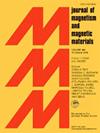Textured CoZn-18H hexaferrite with enhanced Snoek’s product and suppressed magnetic loss
IF 2.5
3区 材料科学
Q3 MATERIALS SCIENCE, MULTIDISCIPLINARY
引用次数: 0
Abstract
Modern communications have created a great demand of magneto-dielectric functional materials having low loss and high permeability properties under the sub-6 GHz band. CoZn-18H planar hexagonal ferrites with strong magnetic anisotropy are more promising in meeting these requirements than that of traditional ferrites. The textured CoZn-18H hexagonal ferrites were synthesized by the reactive templated grain growth (RTGG) method to obtain high magnetic resonance frequency without sacrificing permeability. The layered texture composed of flaky hexagonal particles with a high aspect ratio played an important role in obtaining high permeability and high magnetic resonance frequency. The permeability , magnetic loss tangent tan δμ, and performance factor (PF) of the textured CoZn-18H hexagonal ferrite with the highest Snoek’s product (SP = 6.99 GHz) under 3.41 GHz were 1.66, 0.10, and 56.61 GHz, respectively. Compared with the traditional pure dielectric substrate, a planar inverted F antenna (PIFA) working at 3.0 GHz with a miniaturization rate of 18.1 % was simulated based on the textured CoZn-18H hexagonal ferrite. These results demonstrated that the method of preparing textured CoZn-18H hexagonal ferrites without the application of a magnetic field was effective and revealed the potential of textured planar hexagonal ferrites synthesized by the RTGG method of high-frequency and low-loss applications.

纹理 CoZn-18H 六价铁氧体具有更强的斯诺克积和更低的磁损
现代通信对 6 GHz 以下频段具有低损耗和高磁导率特性的磁介质功能材料提出了巨大需求。与传统铁氧体相比,具有强磁各向异性的 CoZn-18H 平面六方铁氧体更有希望满足这些要求。为了在不牺牲磁导率的情况下获得高磁共振频率,我们采用反应模板晶粒生长(RTGG)方法合成了纹理 CoZn-18H 六方铁氧体。由高纵横比的片状六方颗粒组成的层状纹理在获得高磁导率和高磁共振频率方面发挥了重要作用。在 3.41 GHz 下,具有最高斯诺克乘积(SP = 6.99 GHz)的纹理 CoZn-18H 六方铁氧体的磁导率 μ′、磁损正切 tan δμ 和性能系数(PF)分别为 1.66、0.10 和 56.61 GHz。与传统的纯介质基板相比,基于纹理 CoZn-18H 六方铁氧体模拟了工作频率为 3.0 GHz 的平面倒 F 天线(PIFA),其小型化率为 18.1%。这些结果表明,无磁场制备纹理 CoZn-18H 六方铁氧体的方法是有效的,并揭示了用 RTGG 方法合成的纹理平面六方铁氧体在高频和低损耗应用方面的潜力。
本文章由计算机程序翻译,如有差异,请以英文原文为准。
求助全文
约1分钟内获得全文
求助全文
来源期刊

Journal of Magnetism and Magnetic Materials
物理-材料科学:综合
CiteScore
5.30
自引率
11.10%
发文量
1149
审稿时长
59 days
期刊介绍:
The Journal of Magnetism and Magnetic Materials provides an important forum for the disclosure and discussion of original contributions covering the whole spectrum of topics, from basic magnetism to the technology and applications of magnetic materials. The journal encourages greater interaction between the basic and applied sub-disciplines of magnetism with comprehensive review articles, in addition to full-length contributions. In addition, other categories of contributions are welcome, including Critical Focused issues, Current Perspectives and Outreach to the General Public.
Main Categories:
Full-length articles:
Technically original research documents that report results of value to the communities that comprise the journal audience. The link between chemical, structural and microstructural properties on the one hand and magnetic properties on the other hand are encouraged.
In addition to general topics covering all areas of magnetism and magnetic materials, the full-length articles also include three sub-sections, focusing on Nanomagnetism, Spintronics and Applications.
The sub-section on Nanomagnetism contains articles on magnetic nanoparticles, nanowires, thin films, 2D materials and other nanoscale magnetic materials and their applications.
The sub-section on Spintronics contains articles on magnetoresistance, magnetoimpedance, magneto-optical phenomena, Micro-Electro-Mechanical Systems (MEMS), and other topics related to spin current control and magneto-transport phenomena. The sub-section on Applications display papers that focus on applications of magnetic materials. The applications need to show a connection to magnetism.
Review articles:
Review articles organize, clarify, and summarize existing major works in the areas covered by the Journal and provide comprehensive citations to the full spectrum of relevant literature.
 求助内容:
求助内容: 应助结果提醒方式:
应助结果提醒方式:


